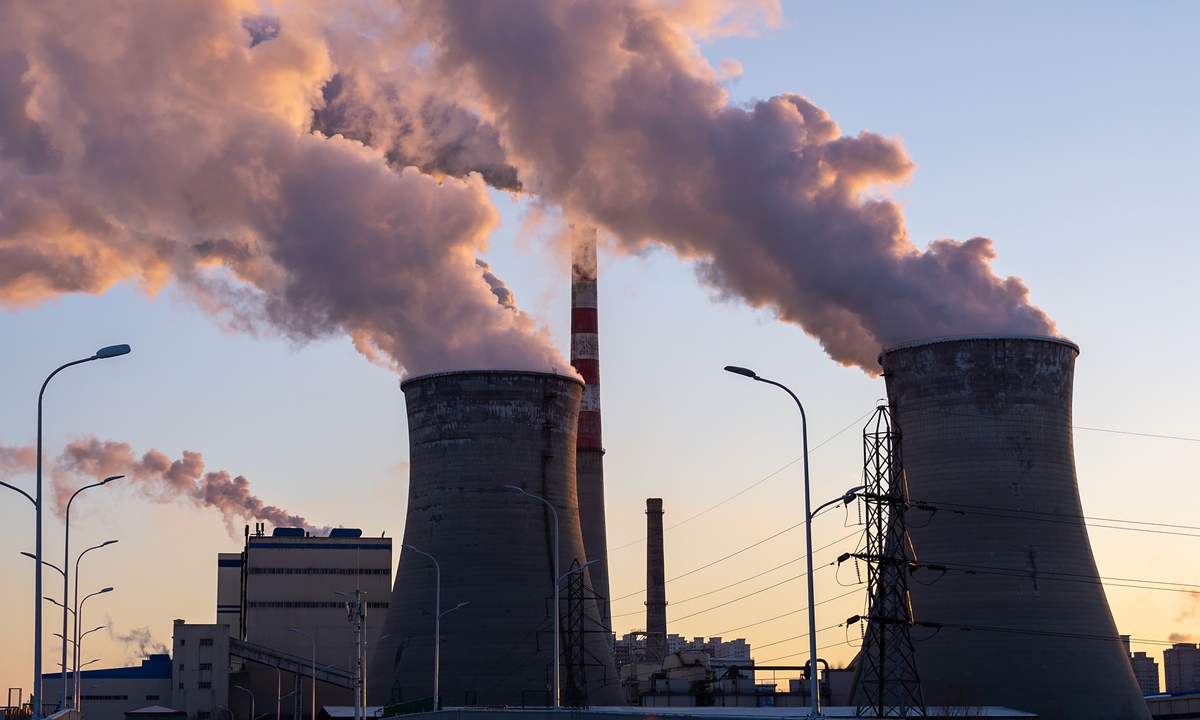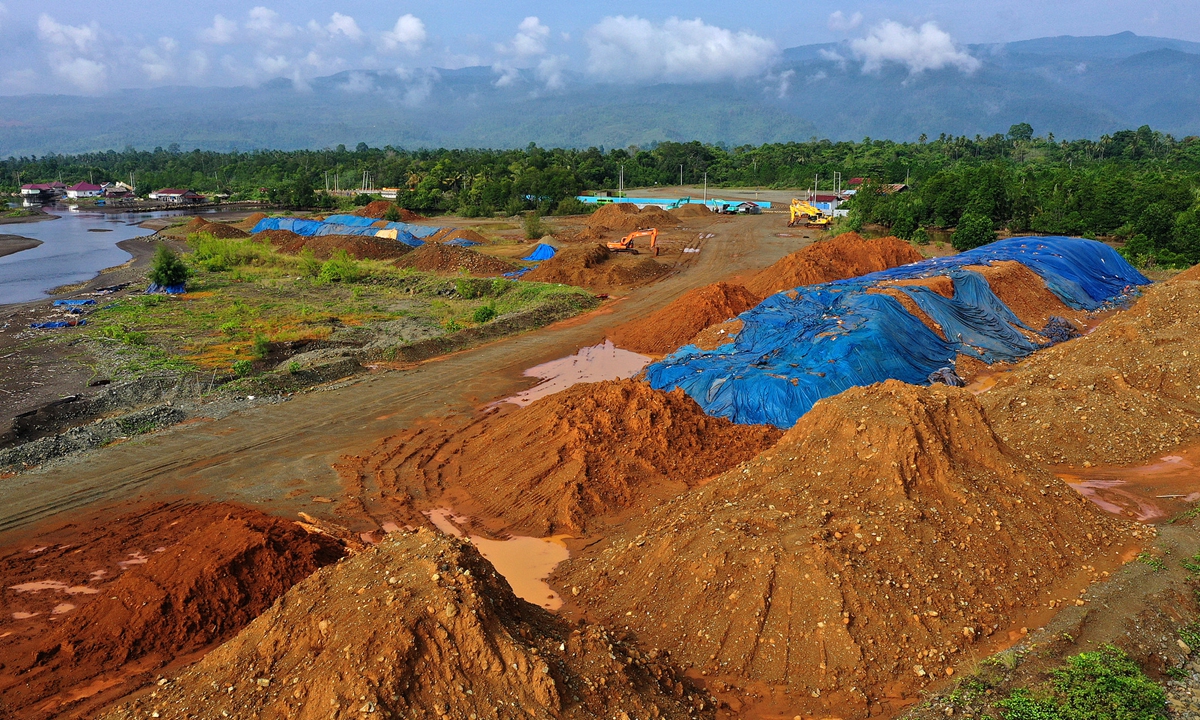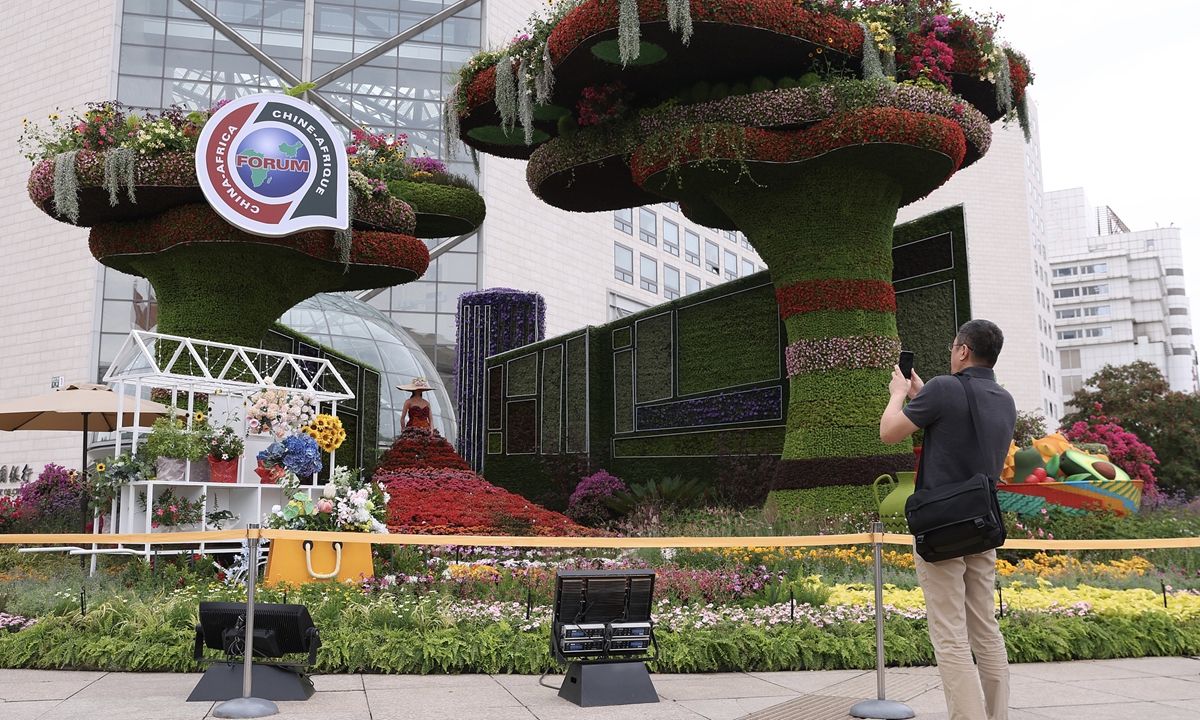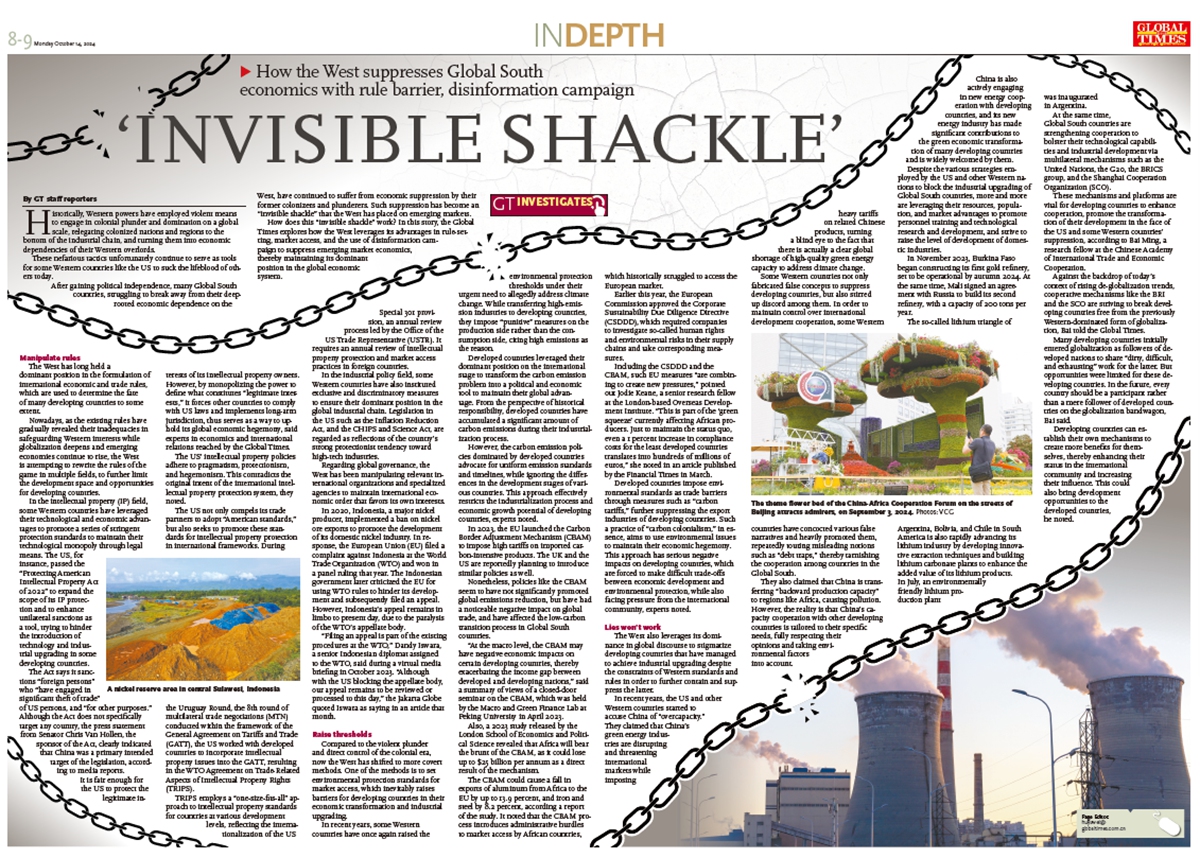
Photo: VCG
Historically, Western powers have employed violent means to engage in colonial plunder and domination on a global scale, relegating colonized nations and regions to the bottom of the industrial chain, and turning them into economic dependencies of their Western overlords.
These nefarious tactics unfortunately continue to serve as tools for some Western countries like the US to suck the lifeblood of others today.
After gaining political independence, many Global South countries, struggling to break away from their deep-rooted economic dependence on the West, have continued to suffer from economic suppression by their former colonizers and plunderers. Such suppression has become an "invisible shackle" that the West has placed on emerging markets.
How does this "invisible shackle" work? In this story, the Global Times explores how the West leverages its advantages in rule-setting, market access, and the use of disinformation campaign to suppress emerging market economics, thereby maintaining its dominant position in the global economic system.
Manipulate rulesThe West has long held a dominant position in the formulation of international economic and trade rules, which are used to determine the fate of many developing countries to some extent.
Nowadays, as the existing rules have gradually revealed their inadequacies in safeguarding Western interests while globalization deepens and emerging economies continue to rise, the West is attempting to rewrite the rules of the game in multiple fields, to further limit the development space and opportunities for developing countries.
In the intellectual property (IP) field, some Western countries have leveraged their technological and economic advantages to promote a series of stringent protection standards to maintain their technological monopoly through legal means. The US, for instance, passed the "Protecting American Intellectual Property Act of 2022" to expand the scope of its IP protection and to enhance unilateral sanctions as a tool, trying to hinder the introduction of technology and industrial upgrading in some developing countries.
The Act says it sanctions "foreign persons" who "have engaged in significant theft of trade" of US persons, and "for other purposes." Although the Act does not specifically target any country, the press statement from Senator Chris Van Hollen, the sponsor of the Act, clearly indicated that China was a primary intended target of the legislation, according to media reports.
It is fair enough for the US to protect the legitimate interests of its intellectual property owners. However, by monopolizing the power to define what constitutes "legitimate interests," it forces other countries to comply with US laws and implements long-arm jurisdiction, thus serves as a way to uphold its global economic hegemony, said experts in economics and international relations reached by the Global Times.
The US' intellectual property policies adhere to pragmatism, protectionism, and hegemonism. This contradicts the original intent of the international intellectual property protection system, they noted.
The US not only compels its trade partners to adopt "American standards," but also seeks to promote these standards for intellectual property protection in international frameworks. During the Uruguay Round, the 8th round of multilateral trade negotiations (MTN) conducted within the framework of the General Agreement on Tariffs and Trade (GATT), the US worked with developed countries to incorporate intellectual property issues into the GATT, resulting in the WTO Agreement on Trade-Related Aspects of Intellectual Property Rights (TRIPS).
TRIPS employs a "one-size-fits-all" approach to intellectual property standards for countries at various development levels, reflecting the internationalization of the US Special 301 provision, an annual review process led by the Office of the US Trade Representative (USTR). It requires an annual review of intellectual property protection and market access practices in foreign countries.
In the industrial policy field, some Western countries have also instituted exclusive and discriminatory measures to ensure their dominant position in the global industrial chain. Legislation in the US such as the Inflation Reduction Act, and the CHIPS and Science Act, are regarded as reflections of the country's strong protectionist tendency toward high-tech industries.
Regarding global governance, the West has been manipulating relevant international organizations and specialized agencies to maintain international economic order that favors its own interests.
In 2020, Indonesia, a major nickel producer, implemented a ban on nickel ore exports to promote the development of its domestic nickel industry. In response, the European Union (EU) filed a complaint against Indonesia at the World Trade Organization (WTO) and won in a panel ruling that year. The Indonesian government later criticized the EU for using WTO rules to hinder its development and subsequently filed an appeal. However, Indonesia's appeal remains in limbo to present day, due to the paralysis of the WTO's appellate body.
"Filing an appeal is part of the existing procedures at the WTO," Dandy Iswara, a senior Indonesian diplomat assigned to the WTO, said during a virtual media briefing in October 2023. "Although with the US blocking the appellate body, our appeal remains to be reviewed or processed to this day," the Jakarta Globe quoted Iswara as saying in an article that month.

A nickel reserve area in central Sulawesi, Indonesia Photo: VCG
Raise thresholdsCompared to the violent plunder and direct control of the colonial era, now the West has shifted to more covert methods. One of the methods is to set environmental protection standards for market access, which inevitably raises barriers for developing countries in their economic transformation and industrial upgrading.
In recent years, some Western countries have once again raised the environmental protection thresholds under their urgent need to allegedly address climate change. While transferring high-emission industries to developing countries, they impose "punitive" measures on the production side rather than the consumption side, citing high emissions as the reason.
Developed countries leveraged their dominant position on the international stage to transform the carbon emission problem into a political and economic tool to maintain their global advantage. From the perspective of historical responsibility, developed countries have accumulated a significant amount of carbon emissions during their industrialization process.
However, the carbon emission policies dominated by developed countries advocate for uniform emission standards and timelines, while ignoring the differences in the development stages of various countries. This approach effectively restricts the industrialization process and economic growth potential of developing countries, experts noted.
In 2023, the EU launched the Carbon Border Adjustment Mechanism (CBAM) to impose high tariffs on imported carbon-intensive products. The UK and the US are reportedly planning to introduce similar policies as well.
Nonetheless, policies like the CBAM seem to have not significantly promoted global emissions reduction, but have had a noticeable negative impact on global trade, and have affected the low-carbon transition process in Global South countries.
"At the macro level, the CBAM may have negative economic impacts on certain developing countries, thereby exacerbating the income gap between developed and developing nations," said a summary of views of a closed-door seminar on the CBAM, which was held by the Macro and Green Finance Lab at Peking University in April 2023.
Also, a 2023 study released by the London School of Economics and Political Science revealed that Africa will bear the brunt of the CBAM, as it could lose up to $25 billion per annum as a direct result of the mechanism.
The CBAM could cause a fall in exports of aluminum from Africa to the EU by up to 13.9 percent, and iron and steel by 8.2 percent, according a report of the study. It noted that the CBAM process introduces administrative hurdles to market access by African countries, which historically struggled to access the European market.
Earlier this year, the European Commission approved the Corporate Sustainability Due Diligence Directive (CSDDD), which required companies to investigate so-called human rights and environmental risks in their supply chains and take corresponding measures.
Including the CSDDD and the CBAM, such EU measures "are combining to create new pressures," pointed out Jodie Keane, a senior research fellow at the London-based Overseas Development Institute. "This is part of the 'green squeeze' currently affecting African producers. Just to maintain the status quo, even a 1 percent increase in compliance costs for the least developed countries translates into hundreds of millions of euros," she noted in an article published by the Financial Times in March.
Developed countries impose environmental standards as trade barriers through measures such as "carbon tariffs," further suppressing the export industries of developing countries. Such a practice of "carbon colonialism," in essence, aims to use environmental issues to maintain their economic hegemony. This approach has serious negative impacts on developing countries, which are forced to make difficult trade-offs between economic development and environmental protection, while also facing pressure from the international community, experts noted.

The theme flower bed of the China-Africa Cooperation Forum on the streets of Beijing attracts admirers, on September 3, 2024. Photo: VCG
Lies won't work
The West also leverages its dominance in global discourse to stigmatize developing countries that have managed to achieve industrial upgrading despite the constraints of Western standards and rules in order to further contain and suppress the latter.
In recent years, the US and other Western countries started to accuse China of "overcapacity." They claimed that China's green energy industries are disrupting and threatening international markets while imposing heavy tariffs on related Chinese products, turning a blind eye to the fact that there is actually a clear global shortage of high-quality green energy capacity to address climate change.
Some Western countries not only fabricated false concepts to suppress developing countries, but also stirred up discord among them. In order to maintain control over international development cooperation, some Western countries have concocted various false narratives and heavily promoted them, repeatedly touting misleading notions such as "debt traps," thereby tarnishing the cooperation among countries in the Global South.
They also claimed that China is transferring "backward production capacity" to regions like Africa, causing pollution. However, the reality is that China's capacity cooperation with other developing countries is tailored to their specific needs, fully respecting their opinions and taking environmental factors into account. China is also actively engaging in new energy cooperation with developing countries, and its new energy industry has made significant contributions to the green economic transformation of many developing countries and is widely welcomed by them.
Despite the various strategies employed by the US and other Western nations to block the industrial upgrading of Global South countries, more and more are leveraging their resources, population, and market advantages to promote personnel training and technological research and development, and strive to raise the level of development of domestic industries.
In November 2023, Burkina Faso began constructing its first gold refinery, set to be operational by autumn 2024. At the same time, Mali signed an agreement with Russia to build its second refinery, with a capacity of 200 tons per year.
The so-called lithium triangle of Argentina, Bolivia, and Chile in South America is also rapidly advancing its lithium industry by developing innovative extraction techniques and building lithium carbonate plants to enhance the added value of its lithium products. In July, an environmentally friendly lithium production plant was inaugurated in Argentina.
At the same time, Global South countries are strengthening cooperation to bolster their technological capabilities and industrial development via multilateral mechanisms such as the United Nations, the G20, the BRICS group, and the Shanghai Cooperation Organization (SCO).
These mechanisms and platforms are vital for developing countries to enhance cooperation, promote the transformation of their development in the face of the US and some Western countries' suppression, according to Bai Ming, a research fellow at the Chinese Academy of International Trade and Economic Cooperation.
Against the backdrop of today's context of rising de-globalization trends, cooperative mechanisms like the BRI and the SCO are striving to break developing countries free from the previously Western-dominated form of globalization, Bai told the Global Times.
Many developing countries initially entered globalization as followers of developed nations to share "dirty, difficult, and exhausting" work for the latter. But opportunities were limited for these developing countries. In the future, every country should be a participant rather than a mere follower of developed countries on the globalization bandwagon, Bai said.
Developing countries can establish their own mechanisms to create more benefits for themselves, thereby enhancing their status in the international community and increasing their influence. This could also bring development opportunities to the developed countries, he noted.








